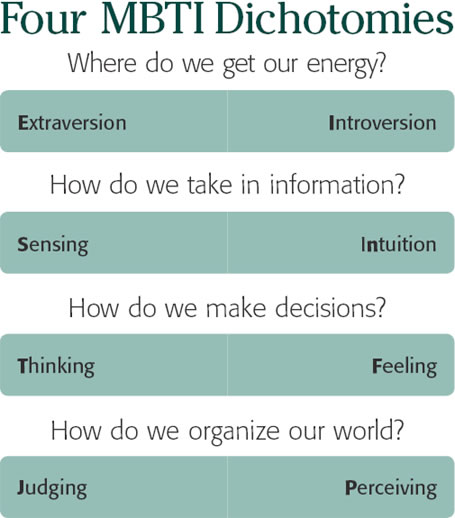Personality Type, MBTI & Carl Jung
MBTI is based on the theories of Carl Jung, the father of Personality Type
Carl Jung’s perspective on personality is quite insightful; he wrote that what appears to be random behavior is actually the result of differences in the way people prefer to use their mental capacities.
Jung’s theory on personality types shows various behavioral patterns and attitudes. Using the theory, you can delve deeper into your own mind and comprehend your thoughts and feelings.
Jung describes our personalities as formed by four pairs of opposite preferences, called “dichotomies”. Each of us prefers one of two ways, in four different categories.

Creating 16 Personality Types
About the Author
Michele Burch Reid, MS, founder of LCI, is an Organizational Effectiveness & Personal Development Consultant and Coach. Michele has a master’s degree in Industrial/Organizational Psychology, as well as several certifications. She helps clients create overall satisfaction & potential by tapping into their natural strengths with Personality Type, Emotional Intelligence Training, Biofeedback & other Brain-based tools. Michele’s philosophy is that when you discover what inspires you, you can more easily inspire and lead others. Whether that is in the board room, the classroom, or the family room.
More From Michele
Extraverted Sensing (SE)
Extraverted Sensing (SE) ESTP - ESFP"What IS" The function when we are focusing our attention on the real and present world, using our 5 senses. For example:Listening to a dog bark. When our brain focuses on the sound of the dog barking, it is exercising...
Eight Cognitive Functions of the MBTI
The 16 MBTI types can be simplified into 8 Cognitive Functions Important to remember: Everyone uses all 8 functions Our type determines our ability to use each function 2 will serve as our strengths 2 will serve as our weakness or blind spots The remaining 4 are our...
Importance of Non-Verbal Communication
The other day while I was grooming my horse, it hit me how important non-verbal communication is. In the words of Keith Whitley, There is so much that is being said “when you say nothing at all”. There is so much trust, loyalty, vulnerability, and even communication...




